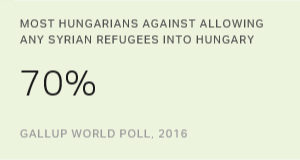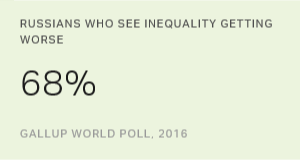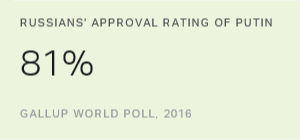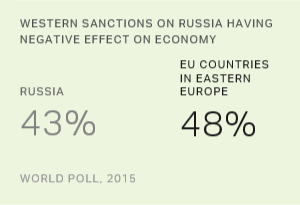Story Highlights
- Anti-refugee sentiment highest in Hungary, Macedonia
- Nearly half in Greece would accept a limited number
WASHINGTON, D.C. -- Though the flow of Syrian refugees into Europe has slowed since 2015, hundreds of thousands of Syrians were still seeking asylum there last year. If many in Eastern Europe had their way, however, the number would be zero. In nine out of 15 Eastern European countries and areas surveyed in 2016, at least half the population believed their country should not accept any Syrian refugees.
| % Should accept ALL Syrian refugees | % Should accept ONLY a limited number | % Should NOT accept any | |||||||||||||||||||||||||||||||||||||||||||||||||||||||||||||||||||||||||||||||||||||||||||||||||
|---|---|---|---|---|---|---|---|---|---|---|---|---|---|---|---|---|---|---|---|---|---|---|---|---|---|---|---|---|---|---|---|---|---|---|---|---|---|---|---|---|---|---|---|---|---|---|---|---|---|---|---|---|---|---|---|---|---|---|---|---|---|---|---|---|---|---|---|---|---|---|---|---|---|---|---|---|---|---|---|---|---|---|---|---|---|---|---|---|---|---|---|---|---|---|---|---|---|---|---|
| Hungary | 3 | 22 | 70 | ||||||||||||||||||||||||||||||||||||||||||||||||||||||||||||||||||||||||||||||||||||||||||||||||
| Macedonia | 2 | 16 | 66 | ||||||||||||||||||||||||||||||||||||||||||||||||||||||||||||||||||||||||||||||||||||||||||||||||
| Montenegro | 2 | 27 | 65 | ||||||||||||||||||||||||||||||||||||||||||||||||||||||||||||||||||||||||||||||||||||||||||||||||
| Slovakia | 1 | 32 | 61 | ||||||||||||||||||||||||||||||||||||||||||||||||||||||||||||||||||||||||||||||||||||||||||||||||
| Latvia | 2 | 33 | 57 | ||||||||||||||||||||||||||||||||||||||||||||||||||||||||||||||||||||||||||||||||||||||||||||||||
| Bulgaria | 1 | 33 | 56 | ||||||||||||||||||||||||||||||||||||||||||||||||||||||||||||||||||||||||||||||||||||||||||||||||
| Czech Republic | 2 | 34 | 56 | ||||||||||||||||||||||||||||||||||||||||||||||||||||||||||||||||||||||||||||||||||||||||||||||||
| Romania | 2 | 35 | 56 | ||||||||||||||||||||||||||||||||||||||||||||||||||||||||||||||||||||||||||||||||||||||||||||||||
| Poland | 2 | 42 | 50 | ||||||||||||||||||||||||||||||||||||||||||||||||||||||||||||||||||||||||||||||||||||||||||||||||
| Serbia | 3 | 39 | 49 | ||||||||||||||||||||||||||||||||||||||||||||||||||||||||||||||||||||||||||||||||||||||||||||||||
| Greece | 4 | 47 | 47 | ||||||||||||||||||||||||||||||||||||||||||||||||||||||||||||||||||||||||||||||||||||||||||||||||
| Albania | 7 | 45 | 44 | ||||||||||||||||||||||||||||||||||||||||||||||||||||||||||||||||||||||||||||||||||||||||||||||||
| Bosnia and Herzegovina | 8 | 35 | 42 | ||||||||||||||||||||||||||||||||||||||||||||||||||||||||||||||||||||||||||||||||||||||||||||||||
| Croatia | 5 | 39 | 40 | ||||||||||||||||||||||||||||||||||||||||||||||||||||||||||||||||||||||||||||||||||||||||||||||||
| Kosovo | 6 | 49 | 38 | ||||||||||||||||||||||||||||||||||||||||||||||||||||||||||||||||||||||||||||||||||||||||||||||||
| ���۴�ýWorld Poll, 2016 | |||||||||||||||||||||||||||||||||||||||||||||||||||||||||||||||||||||||||||||||||||||||||||||||||||
Many of the countries with the strongest opposition to allowing Syrian refugees are located along the Balkan route that once channeled asylum seekers from Greece to Germany. European leaders effectively closed the route last March and signed a deal with Turkey to send migrants back if they did not apply for asylum or if their claim was rejected. All of Gallup's surveys in Eastern Europe took place after the agreement with Turkey. Per the agreement, for every Syrian migrant sent back to Turkey, one already in Turkey needs to relocate to the European Union.
Anti-refugee sentiment is highest in EU member states such as Hungary, which has erected border fences to keep migrants out and, just last month, passed new controversial laws that would confine asylum seekers to camps constructed from shipping containers. Seven in 10 Hungarians in 2016 said their country should not accept any Syrian refugees. Sentiment was similarly high (66%) in non-EU member state Macedonia, which was on the front lines of the migrant wave in 2015 and sealed its border with Greece to keep them out.
No more than 8% of residents in any country or area surveyed in 2016 said their country should accept all Syrian refugees. Residents of countries or areas with larger Muslim populations -- such as Bosnia and Herzegovina, Albania, and Kosovo -- tended to be the most open to allowing refugees from majority-Muslim Syria. Kosovo was the most open to accepting a limited number of Syrian refugees (49%).
Greeks, however, closely trailed behind Kosovo residents in believing that a limited number of Syrian refugees should be accepted (47%). This is notable because even if it is not the final destination for migrants, Greece has been an entry point to Europe for hundreds of thousands in the recent crisis. Overall, Greeks are divided on the matter, leaning slightly toward accepting all Syrian refugees (4%) or a limited number of refugees (47%), than not wanting to accept any (47%).
Religious Affiliation Shapes Views Toward Refugees
Although people assume that young adults are typically more accepting of individuals from different backgrounds, there are no differences in attitudes toward refugees by age or, for that matter, by gender or several other demographic factors. Religious affiliation actually emerges as the strongest predictor of people's attitudes toward these refugees. Overall, those identifying themselves as Muslim were the least likely to say their countries should not accept any Syrian refugees (36%). Self-identified Muslims were more likely than members of other religious groups to favor allowing a limited number of (44%) or all (8%) Syrian refugees in their countries.
| % Should accept ALL Syrian refugees | % Should accept ONLY a limited number | % Should NOT accept any Syrian refugees | |||||||||||||||||||||||||||||||||||||||||||||||||||||||||||||||||||||||||||||||||||||||||||||||||
|---|---|---|---|---|---|---|---|---|---|---|---|---|---|---|---|---|---|---|---|---|---|---|---|---|---|---|---|---|---|---|---|---|---|---|---|---|---|---|---|---|---|---|---|---|---|---|---|---|---|---|---|---|---|---|---|---|---|---|---|---|---|---|---|---|---|---|---|---|---|---|---|---|---|---|---|---|---|---|---|---|---|---|---|---|---|---|---|---|---|---|---|---|---|---|---|---|---|---|---|
| Christian | 2 | 38 | 54 | ||||||||||||||||||||||||||||||||||||||||||||||||||||||||||||||||||||||||||||||||||||||||||||||||
| Islam/Muslim | 8 | 44 | 36 | ||||||||||||||||||||||||||||||||||||||||||||||||||||||||||||||||||||||||||||||||||||||||||||||||
| Atheist | 1 | 32 | 63 | ||||||||||||||||||||||||||||||||||||||||||||||||||||||||||||||||||||||||||||||||||||||||||||||||
| ���۴�ýWorld Poll, 2016 | |||||||||||||||||||||||||||||||||||||||||||||||||||||||||||||||||||||||||||||||||||||||||||||||||||
Those who identified themselves as atheists or secular (63%) were more likely than those who identified with a particular faith to say their countries should not accept Syrian refugees. Among Christians, similar percentages of orthodox (54%), Protestant (57%) or Catholic (53%) adherents said their countries should not accept any Syrian refugees.
Bottom Line
Fewer migrants or asylum seekers have been arriving in Europe since Turkey and the EU signed their agreement more than a year ago. But as Syria's civil war continues, Syrians remain among the top three citizenships of asylum seekers in the EU; the refugee crisis is far from being declared over.
The quandary now, and likely going forward, is how to deal with the division in Europe about what to do with the refugees who are already there and those who may still come. Leaders from Hungary, Poland, Slovakia and the Czech Republic -- where public opinion is firmly against accepting refugees -- have openly rejected the EU policy that calls for member states to take in a quota of refugees, drawing warnings from the EU's leadership. The leaders of these countries, in turn, have said the EU is trying to blackmail them into accepting refugees.
While charges like this threaten the bloc's unity, not everyone -- even in these four countries -- is opposed to the EU's current policy. More than one in three in EU member states and non-EU member states in Eastern Europe say their countries should accept a limited number of Syrian refugees, and this percentage is even higher among residents who also approve of the EU's leadership. At the same time, even among the EU leadership's support base in the region, about half also say that their countries should not allow any Syrian refugees.
Survey Methods
Results are based on face-to-face interviews with 1,000 adults in each country, aged 15 and older, conducted in April to July 2016. For results based on the total sample of national adults, the margin of sampling error ranged from ±3.5 percentage points to ±3.8 percentage points. The margin of error reflects the influence of data weighting. In addition to sampling error, question wording and practical difficulties in conducting surveys can introduce error or bias into the findings of public opinion polls.
For complete methodology and specific survey dates, please review .
Learn more about how the works.




